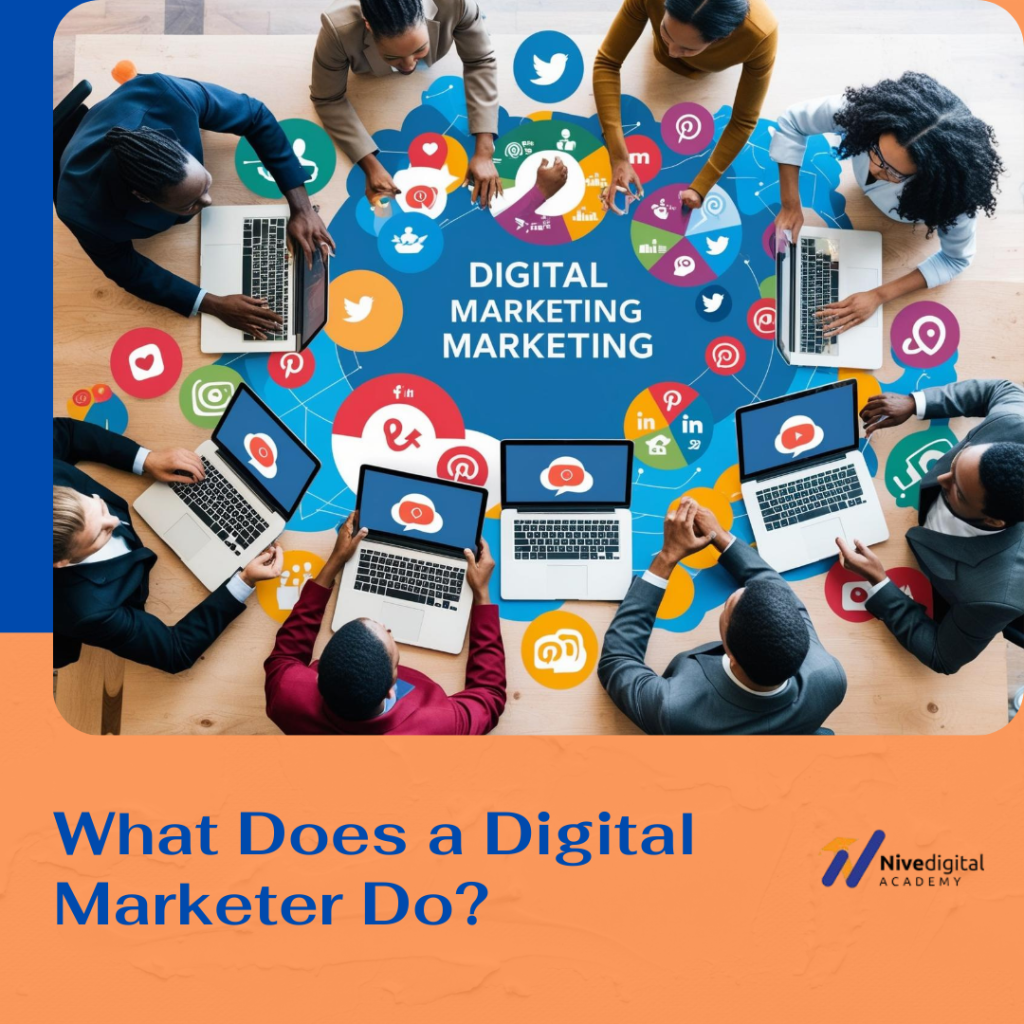
A digital marketer helps businesses grow by promoting products or services online. Businesses use digital marketing to reach customers, increase sales, and build brand awareness.
Digital marketers use different online platforms and tools to connect with audiences. They create content, manage social media, optimize websites for search engines, and run paid ads. Their goal is to attract, engage, and convert potential customers.
This guide explains the roles, responsibilities, and skills needed to succeed in digital marketing.
Core Responsibilities of a Digital Marketer
Digital marketers work in different areas of online marketing. Their tasks depend on their job role and the company’s needs. Below are the main responsibilities of a digital marketer.
1. Search Engine Optimization (SEO)
SEO helps websites rank higher on search engines like Google and Bing. A digital marketer improves a website’s visibility by:
- Using relevant keywords in website content.
- Improving website speed and mobile-friendliness.
- Building backlinks from other trusted websites.
- Creating high-quality content that answers user questions.
SEO is important because it helps businesses get free (organic) traffic from search engines.
2. Content Marketing
Content marketing involves creating useful and engaging content for an audience. Digital marketers create:
- Blog posts and articles.
- Videos and infographics.
- E-books and whitepapers.
- Social media posts.
Content marketing helps businesses attract customers, build trust, and increase sales.
3. Social Media Marketing
A digital marketer manages social media accounts on platforms like:
- Twitter (X)
- TikTok
Their tasks include:
- Creating and posting engaging content.
- Replying to comments and messages.
- Running paid ads to reach a wider audience.
- Tracking social media performance and engagement.
Social media marketing helps businesses grow their audience and stay connected with customers.
4. Pay-Per-Click (PPC) Advertising
PPC advertising allows businesses to pay for online ads. Digital marketers set up and manage ads on platforms like:
- Google Ads
- Facebook Ads
- Instagram Ads
- LinkedIn Ads
Their tasks include:
- Researching and selecting the best keywords.
- Writing ad copy that attracts clicks.
- Setting budgets to control spending.
- Monitoring ad performance and adjusting campaigns.
PPC helps businesses get fast and targeted traffic to their websites.
5. Email Marketing
Email marketing helps businesses send promotional messages to customers. Digital marketers use email to:
- Send newsletters with updates and offers.
- Promote new products or services.
- Nurture leads and convert them into buyers.
- Retain existing customers with follow-up emails.
They use tools like MailChimp, ConvertKit, and Sendinblue to create and automate emails.
6. Web Analytics and Performance Tracking
A digital marketer tracks and measures marketing performance using analytics tools. Common tools include:
- Google Analytics – Tracks website visitors and their actions.
- Facebook Insights – Monitors social media engagement.
- SEO tools (Ahrefs, SEMrush, Moz) – Checks keyword rankings and backlinks.
Marketers use data to improve campaigns and increase results.
7. Conversion Rate Optimization (CRO)
CRO helps businesses increase the number of website visitors who take action (buy, sign up, or contact). Digital marketers improve conversion rates by:
- Writing strong call-to-action (CTA) messages.
- Improving website design for better user experience.
- Testing different marketing strategies (A/B testing).
A higher conversion rate means more customers and sales.
8. Affiliate Marketing
Some businesses use affiliates (partners) to promote their products in exchange for a commission. Digital marketers manage affiliate programs by:
- Recruiting affiliates and influencers.
- Providing marketing materials like banners and links.
- Tracking affiliate sales and commissions.
Affiliate marketing helps businesses reach more customers without high advertising costs.
Types of Digital Marketers
Digital marketers can specialize in different areas. Below are the most common digital marketing roles:
1. SEO Specialist
An SEO specialist focuses on improving search engine rankings by optimizing content, keywords, and website structure.
2. Content Marketer
A content marketer creates blog posts, videos, and social media content to attract and engage audiences.
3. Social Media Manager
A social media manager handles business social media pages, creates posts, and engages with followers.
4. Paid Ads Specialist
A paid ads specialist runs and manages online advertising campaigns on platforms like Google Ads and Facebook Ads.
5. Email Marketing Specialist
An email marketing specialist creates and sends email campaigns to promote products and services.
6. Digital Marketing Manager
A digital marketing manager oversees all digital marketing activities in a company, including SEO, content, social media, ads, and email marketing.
Skills Needed to Become a Digital Marketer
A successful digital marketer needs:
- Analytical skills – To track campaign performance.
- Creativity – To create engaging content.
- Communication skills – To interact with customers.
- Technical skills – To use marketing tools and platforms.
- Problem-solving skills – To improve marketing strategies.
Digital marketers must keep learning because digital marketing trends change over time.
Tools Used by Digital Marketers
Digital marketers use different tools to improve marketing performance. Some popular tools include:
- SEO Tools – Google Search Console, Ahrefs, SEMrush
- Social Media Tools – Buffer, Hootsuite, Canva
- Email Marketing Tools – MailChimp, ConvertKit, Sendinblue
- Analytics Tools – Google Analytics, Facebook Insights
- Ad Platforms – Google Ads, Facebook Ads, LinkedIn Ads
These tools help digital marketers manage and improve campaigns efficiently.
How to Become a Digital Marketer
1. Learn Digital Marketing Basics
Start by understanding SEO, content marketing, social media, PPC, and email marketing.
2. Take Online Courses
Enroll in free and paid courses from Google Digital Garage, HubSpot Academy, and Udemy.
3. Get Practical Experience
Practice by creating a blog, running social media pages, or managing small business campaigns.
4. Build a Portfolio
Showcase your skills by creating case studies and examples of past work.
5. Apply for Jobs or Freelance Work
Look for digital marketing jobs on LinkedIn, Jobberman, and Upwork.
6. Stay Updated
Follow digital marketing blogs and news to learn about industry changes.
Conclusion
Digital marketers help businesses grow by creating content, managing ads, optimizing websites, and engaging customers online. The job requires creativity, analytical skills, and technical knowledge.
By learning digital marketing, practicing with real projects, and building a portfolio, you can start and grow a successful career in this field.
Frequently Asked Questions (FAQs)
1. Can I become a digital marketer without a degree?
Yes. Most digital marketing skills can be learned through online courses and practice. Employers value skills and experience over degrees.
2. How much do digital marketers earn in Nigeria?
Salaries vary based on experience and role:
- Entry-level: ₦80,000 – ₦200,000 per month
- Mid-level: ₦200,000 – ₦500,000 per month
- Senior-level: ₦500,000+ per month
Freelancers can earn more depending on their clients and projects.
3. What industries need digital marketers?
Almost every industry needs digital marketers, including:
- E-commerce
- Banking and finance
- Real estate
- Healthcare
- Technology startups
4. How long does it take to become a digital marketer?
With consistent learning and practice, you can gain basic skills in 3–6 months and become highly skilled in 1–2 years.

Article by:
Oyejobi Adeola, founder of NiveDigital & NiveDigital Academy, is a top expert in SEO and digital marketing.
With over a decade of experience, he has helped businesses grow through advanced SEO strategies and trained hundreds of students to succeed online.
His insights have been featured in top industry publications.


